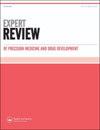The combination of encorafenib and binimetinib for the treatment of patients with BRAF-mutated advanced, unresectable, or metastatic melanoma: an update
IF 1.2
Q4 PHARMACOLOGY & PHARMACY
Expert Review of Precision Medicine and Drug Development
Pub Date : 2021-01-02
DOI:10.1080/23808993.2021.1847639
引用次数: 2
Abstract
ABSTRACT Introduction: In the treatment of advanced BRAF-mutated melanoma, selective regulation of the MAPK pathway with BRAF and MEK inhibition has emerged as one of the mainstays of therapy. Areas covered: Introduction of MAPK pathway. Current data on BRAF inhibition from phase I, II, and III trials in the setting of unresectable disease. Current data on encorafenib and binietinib, their chemistry, pharmacokinetic, and pharmacodynamic properties. Discussion on use of encorafenib therapy as a single agent as well as in combination with binimetinib and other systemic therapies. Expert opinion: BRAF inhibition with encorafenib exhibits substantial antitumor activity with less paradoxical MAPK pathway activation leading to treatment resistance. Combination therapy with binimetinib improves response rate, progression-free survival, and overall survival in patients with BRAF-mutated unresectable, metastatic melanoma. Serious adverse events, including development of cutaneous malignancies, are reported at lower rates with combination therapy, while less severe events such as pyrexia can be more common.encorafenib和binimetinib联合治疗braf突变的晚期、不可切除或转移性黑色素瘤:最新进展
摘要简介:在晚期BRAF突变黑色素瘤的治疗中,BRAF和MEK抑制对MAPK通路的选择性调节已成为治疗的支柱之一。涵盖的领域:MAPK途径的介绍。在不可切除疾病的情况下,来自I、II和III期试验的BRAF抑制的最新数据。目前关于安可非尼和比尼替尼的数据,它们的化学、药代动力学和药效学特性。关于安可芬尼治疗作为单一药物以及与二甲替尼和其他全身治疗联合使用的讨论。专家意见:encorafenib对BRAF的抑制表现出显著的抗肿瘤活性,MAPK通路的异常激活较少,导致治疗耐药性。二甲替尼联合治疗可提高BRAF突变的不可切除转移性黑色素瘤患者的反应率、无进展生存率和总生存率。据报道,联合治疗的严重不良事件,包括皮肤恶性肿瘤的发生率较低,而发热等不太严重的事件可能更常见。
本文章由计算机程序翻译,如有差异,请以英文原文为准。
求助全文
约1分钟内获得全文
求助全文
来源期刊

Expert Review of Precision Medicine and Drug Development
PHARMACOLOGY & PHARMACY-
CiteScore
2.30
自引率
0.00%
发文量
9
期刊介绍:
Expert Review of Precision Medicine and Drug Development publishes primarily review articles covering the development and clinical application of medicine to be used in a personalized therapy setting; in addition, the journal also publishes original research and commentary-style articles. In an era where medicine is recognizing that a one-size-fits-all approach is not always appropriate, it has become necessary to identify patients responsive to treatments and treat patient populations using a tailored approach. Areas covered include: Development and application of drugs targeted to specific genotypes and populations, as well as advanced diagnostic technologies and significant biomarkers that aid in this. Clinical trials and case studies within personalized therapy and drug development. Screening, prediction and prevention of disease, prediction of adverse events, treatment monitoring, effects of metabolomics and microbiomics on treatment. Secondary population research, genome-wide association studies, disease–gene association studies, personal genome technologies. Ethical and cost–benefit issues, the impact to healthcare and business infrastructure, and regulatory issues.
 求助内容:
求助内容: 应助结果提醒方式:
应助结果提醒方式:


